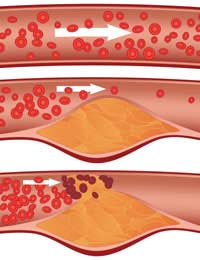What Are Anti-phospholipid Antibodies (APAs)?

Anti-phospholipid antibodies are antibody molecules produced by the body against its own phospholipids. These are fat molecules with phosphorus groups attached and they are present in every cell membrane of every cell in the body. Making antibodies to the membrane of your own cells is abnormal and is associated with different autoimmune diseases such as systemic lupus erythematosus. Producing anti phospholipid antibodies causes a range of illnesses; the most severe is catastrophic anti-phospholipid syndrome, in which the antibodies attack every organ of the body. This is usually fatal.
Milder health problems include deep vein thrombosis – the antibodies attack the inside of veins and arteries, making clots more likely. Women who produce anti phospholipid antibodies often have difficulty getting pregnant and, if they do, the antibodies damage the placenta that feeds the growing baby and miscarriage and other complications of pregnancy are common.
Anti-phospholipid Antibodies and Infertility
During the early part of pregnancy, the cells of the embryo divide rapidly. When implantation occurs, the placenta forms to bring the blood supply of the mother directly to the blood circulation of the developing foetus. Although there is a placental barrier that stops some transfer of potentially harmful molecules, other molecules can get across. Anti-phospholipid antibodies can fix onto cell membranes of cells inside the blood vessels of the placenta, making them less efficient at carrying blood. As the baby needs more oxygen, this causes poor growth and miscarriage at about the 20th week of pregnancy can occur as a critical point is reached.If the pregnancy continues past that time, there is a higher risk of the mother developing pre-eclampsia and of blood clots forming in the placental blood vessels. Babies of mothers with anti phospholipid antibodies that survive tend to be born prematurely and can suffer developmental problems, both physical and mental.
Testing Women Showing Signs of Infertility
There are many causes of infertility and having higher than normal levels of anti-phospholipid antibodies is a relatively rare cause. More likely reasons need to be ruled out before it is worth doing a test, unless a woman is showing other signs of having an autoimmune syndrome. Anti-phospholipid antibodies can be detecting using a blood test, which can also detect other antibodies that may be present that are directed towards the woman’s own tissues.Other tests are then available to see if the woman concerned has other signs of an autoimmune disorder. Genetic mutations that increase production of anti-phospholipid antibodies have been described recently and three major mutations – the Factor 5 Leiden variant, the MTHFR mutation and a mutation in the gene that codes for the blood factor prothrombin – can all be checked using standard DNA testing procedures.


Re: What Causes Sperm Loss?
antiquities. These are the Egyptian papyri
Re: What Causes Sperm Loss?
from lat. manus - "hand" and scribo - "I write") ]
Re: Ovary Transplants: Are They Possible?
Hi! I 37 years old single mather. I was ovary gonadoblastoma in 2013. Removed both ovaryes . I take hormon pills but…
Re: Ovary Transplants: Are They Possible?
I am a 54 year old women who went through an early menopause. Since then I have developed all sorts of issues which I…
Re: Ovary Transplants: Are They Possible?
I have pcos with it cure it if I have this done
Re: Ovary Transplants: Are They Possible?
We are from India and my wife got pregnant through IVF treatment, now she is in her 17th week of pregnancy. We have…
Re: Ovary Transplants: Are They Possible?
Janaka - Your Question:Hi everyone,My wife 28 years old, her both ovaries removed due to cyst after that she is facing…
Re: Ovary Transplants: Are They Possible?
Hi everyone, My wife 28 years old, her both ovaries removed due to cyst after that she is facing lot's lot's of…
Re: What Causes Sperm Loss?
I'm seeing only watered with little amount of white colour when it come out from my anus .wt is ur suggestions for this . please send reply.
Re: Ovary Transplants: Are They Possible?
I'm 38 years old , and I'm on HRT tablets because I have high hormones levels (FSH, LH) post menopausal, can I do…